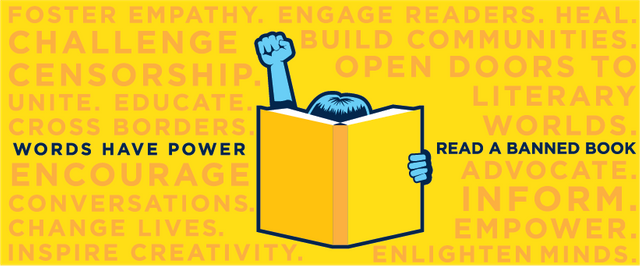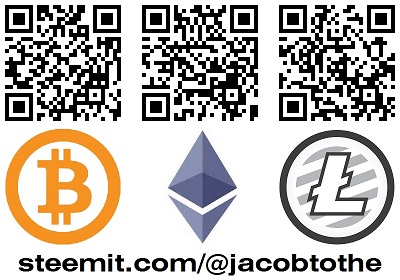Banned Books Week is winding down
The American Library Association has designated the last full week of September as Banned Books Week for the past 35 years. This is when when libraries celebrate the right to freedom of the press by highlighting books that have been challenged, banned, or burned around the world.

Image credit
Books that have been banned ironically include *Fahrenheit 451," an anti-censorship and anti-authoritarian novel if ever there was one. Ernest Hemingway has had several books banned over the years, and along with the likes of Sinclair Lewis and Jack London, was censored in Nazi Germany. Louisa May Alcott's Little Women was deemed "too feminist" when it was first published, yet has more recently been accused of being "too traditionalist." Mark Twain's Huckleberry Finn has recently been attacked for using "the n-word" despite its portrayal of Jim the runaway slave as a noble character, but the book has never been a stranger to conflict judging by this New York Times letter from 1902.
Along with works of classic literature that helped advance the art form and explore new ideas, many of the "challenged" books are arguably of little literary merit. However, censorship efforts demonstrate the Streisand Effect perfectly. Literature with little merit usually causes a stir upon release, especially if it is scandalous or otherwise provocative, but it usually is just a flash in the pan. Public interest vanishes quickly, and people forget about it. However, if some censorship-minded individual gets their knickers in a twist and tries to ban something, it brings the item to the front of public consciousness every September.
Serves you right, you busybody control freak, even if it means annually advertising Twilight. I can handle that burden more readily than I can handle your Puritanical power trip.
Even if "objectionable" books don't peacefully fade into obscurity, it's absurd to demand control over what other people are allowed to read. To claim such authority is to claim ownership over others, and there is no virtue in attempting to usurp another person's mind. Such authoritarianism is far more dangerous than any trashy novel, scandalous essay, or provocative character.
If you like this post, please comment, follow, and resteem!

There are subjects we'll certainly often disagree on...
but not THIS one. The only purpose external censorship fulfills is oppressive.
It does beg the question of how to deal with purely negative (nearly always even for the author) material that gets published, now that libraries aren't the gateways of public education throughout most of the world, what with the pervasive nature of content distribution in all its forms, and that's a question that desperately requires discussion, not avoidance. I'm thinking terrorist propaganda, snuff porn, slave recruiting, etc.
There is a definite question of what constitutes an actual danger, and what is just provocative to the thin-skinned. Our library doesn't have a subscription to pornographic magazines, and some might argue that it is "censorship" to not provide such materials.
Monty Python once did a skit, 'The Killing Joke', that is the sole example of 'dangerous' information I can recall.
How can information be dangerous? It cannot commit a criminal act.
Laws apply to people, not rocks, gods, or information.
In popular culture, there are quite a number of stories (nearly all sf and fantasy) over the years (I don't even think Henry Kuttner, (or maybe it was Cathy Moore) was the first, and he/she/they was/were writing this stuff in the 1940s, if not '30s) that used the concept. That memes are weaponized is simply an extension of learned psychological techniques, and who's to say it didn't start with the classical Greeks or before?
There are more than 100k people employed to censor the internet of the things you point out, amongst others.
It is important to recognize that ALL of us self censor. Whether we decline to view porn, or fluffy bunnies, we choose what to not include in our content.
I do not agree with censorship being imposed on free people - for any reason. Even the argument that people wouldn't make offensive images if there was no market for them is inadequate to justify censorship, as there are more appropriate means of preventing those images from being made - and that is where the actual laws belong.
Indeed, by censoring things, those producing censored content are driven to undertake cryptic means to distribute it, making enforcement of laws against such criminal acts as are being censored vastly more difficult.
In the final analysis, censorship is simply adding a problem to the problems those advocating it are seeking to solve.
Thanks!
And that's the key difference - individual discernment versus dictatorial censorship.
So many good reads on the banned list. In high school I actually found that such a thing as a banned book list existed and set out to read them all!
And I still reread them . Particularly Fahrenheit 451! A wonderfully cautionary tale for even these times.
Fahrenheit 451 needs to paid attention to. YouTube is in the process of trying to shut down all conservative channels by deeming them advertiser unfriendly and starving them financially. Whether you are conservative or not is not the issue. Someone else may try to silence you and your opinions some day. This country hasn't been free for years. The mind patrol police are everywhere. It's a sorry state of affairs. I was born in the 50's in the US and I can honestly say that people in my generation probably lived a better life style than anyone ever in world history. I am not optimistic about the future for my kids unfortunately.
Youtube doesn't particularly bother me. They aren't a government. If they fail to serve their customers and content providers, people will look elsewhere. Steemit and dtube are now alternatives to social media and video hosting, for example.
Government is legally precluded from doing many things by the Constitution. For this reason governments hire private contractors, such as Gargle, to do them for them.
Such prohibitions as apply to government needs must apply to private parties, or government be precluded from contracting.
On that note, government has no lawful authority to undertake any act any private person does not.
Power, on the other hand, is certainly attained and used by government, and private companies. Just as it is illegal to refuse to rent an apartment to someone because they are a certain race, it should be illegal to refuse to rent an apartment to someone because they are a certain political party member.
Same goes for Youtool channels and videos, IMHO.
And yet, government sidesteps the Constitution regularly anyway, and uses weasel words to justify it. Government operates entirely through claims to authority individuals do not have, and thus cannot rightly delegate to politicians.
"Private contractors" as government proxies are clearly a problem, and corporations are government-established legal fictions with special privileges and immunities, but this is clearly a flaw of government more than anything else.
I would caution against appealing to legality to support a rational argument, too. After all, slavery was "legal" across most of the world until quite recently, and the Underground Railroad was "illegal," for just one obvious example.
Point is well taken. I have long differentiated between what is legal and what is lawful, the former being whatever scribblings are undertaken by shills for our overlords, and the latter being what is actually just.
They may not be government but they are definitely in bed with them as are the banks, Google and a lot of other corporations. A discussion for another day.
While you mention that some censored works are 'of little literary merit', the examples of such you provided are amongst the most significant literary merit of which I am aware.
Ray Bradbury's 'Fahrenheit 451', and Sinclair Lewis' 'The Jungle', etc. are perfect examples of why censorship sux0rs, and why it needs to end.
We are probably more censored now, online, than we ever have been in the past.
I thought I differentiated between the listed items as "literary merit" class, and the paranormal romances like Twilight as examples of the "no literary merit" category. Apologies if it wasn't clear.